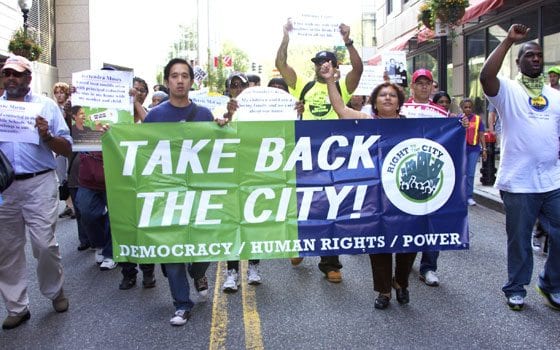



A crowd of more than 1,000 people turned out Saturday for a rally on Fowler Street in Dorchester, a one-block street where 12 homes are in various stages of foreclosure. (Ernesto Arroyo photo)
| The rally in Dorchester against corporate greed and home foreclosures underscores growing popular outrage over the nation’s economic crisis. In another protest, 24 people were arrested last week near the Bank of America in downtown Boston. (Ernesto Arroyo photos) |
In Boston Friday, 24 people were arrested when they refused to leave a Bank of America building downtown.
In Dorchester, where activists occupied a foreclosed Fowler Street triple decker now owned by Deutsche Bank, there have been no arrests, but the occupiers say they have no intention of leaving.
“A strong message needs to be sent to these banks about no-fault evictions,” said clothing designer Antonio Ennis, who is facing foreclosure on his Dorchester home.
Ennis is one of several activists occupying the Fowler Street triple decker. Activists have had water, gas and electricity switched on and say they are prepared to occupy the building indefinitely.
Saturday’s action was organized by the Boston members of the Right to the City Coalition, a nationwide organization of groups fighting gentrification and economic policies they say have led to the growing wealth inequalities in the United States.
A crowd estimated at more than 1,000 gathered on Fowler Street Saturday, rallying in front of the occupied triple decker and helping create a community garden on plot of city-owned land around the corner on Ellington Street.
Tony Romano, lead organizer for Right to the City, said the Occupy Wall Street demonstrations erupting across the country are coinciding with his group’s more aggressive stance against the banks that are responsible for the majority of foreclosures in low-income communities.
“People have been rallying and protesting and the banks are not budging,” he said. “If that means more civil disobedience is necessary, then we have to go in that direction.”
Right to the City, which held a national conference in Boston last weekend, bused conference attendees to the Fowler Street demonstration. Other groups participating in the Fowler Street rally included New England United for Justice, Alternatives for Community and Environment, Service Employees International Union Local 1199, the Massachusetts Senior Action Council and the Greater Four Corners Action Coalition.
Jamaica Plain-based activist Tarso Ramos said the collaboration of so many local and regional groups on an action is new for Boston.
“Communities are becoming increasingly organized,” he said. “And you’re seeing an escalation of tactics that’s borne of the lack of action over foreclosure. People are realizing that direct action provokes a response.”
Marvin Martin, executive director of the Four Corners Action Coalition, says his organization gets one or two requests from homeowners facing foreclosure every day.
“There are 12 houses in various stages of foreclosure on Fowler Street alone,” he said.
Fowler Street runs one block between Glenway and Greenwood streets near Franklin Park.
The immediate demands of the Fowler Street demonstrators are decidedly more pedestrian than those of the activists camped out on Wall Street and in Boston’s financial district.
The Dorchester protesters are asking that banks negotiate in good faith with families facing foreclosure, allow loan modifications that include a reduction in the principal of the home loan, allow nonprofits to buy foreclosed homes and sell them back to families that have been foreclosed and cease illegal evictions of tenants in foreclosed apartment buildings.
“We’re trying to figure out how to pilot projects that will keep people in their homes,” Martin said.
Ennis said negotiating with Bank of America has been a frustrating process.
“It’s been very, very slow and very discouraging, which is why I found my way to City Life,” he said, referring to the Jamaica Plain-based community group. “They gave me hope and they gave me back my voice.”







